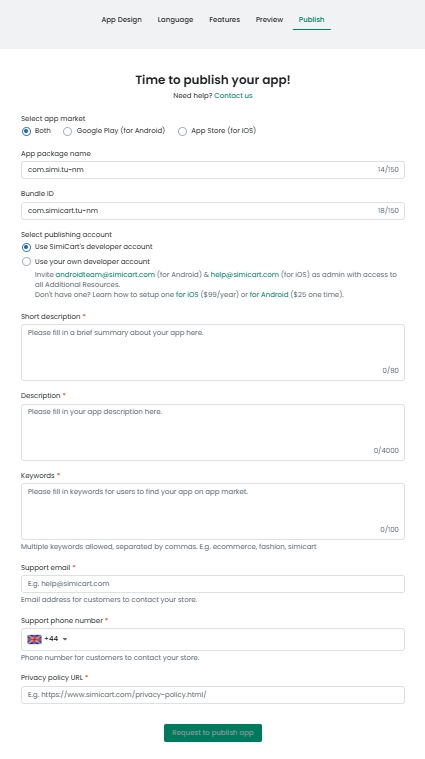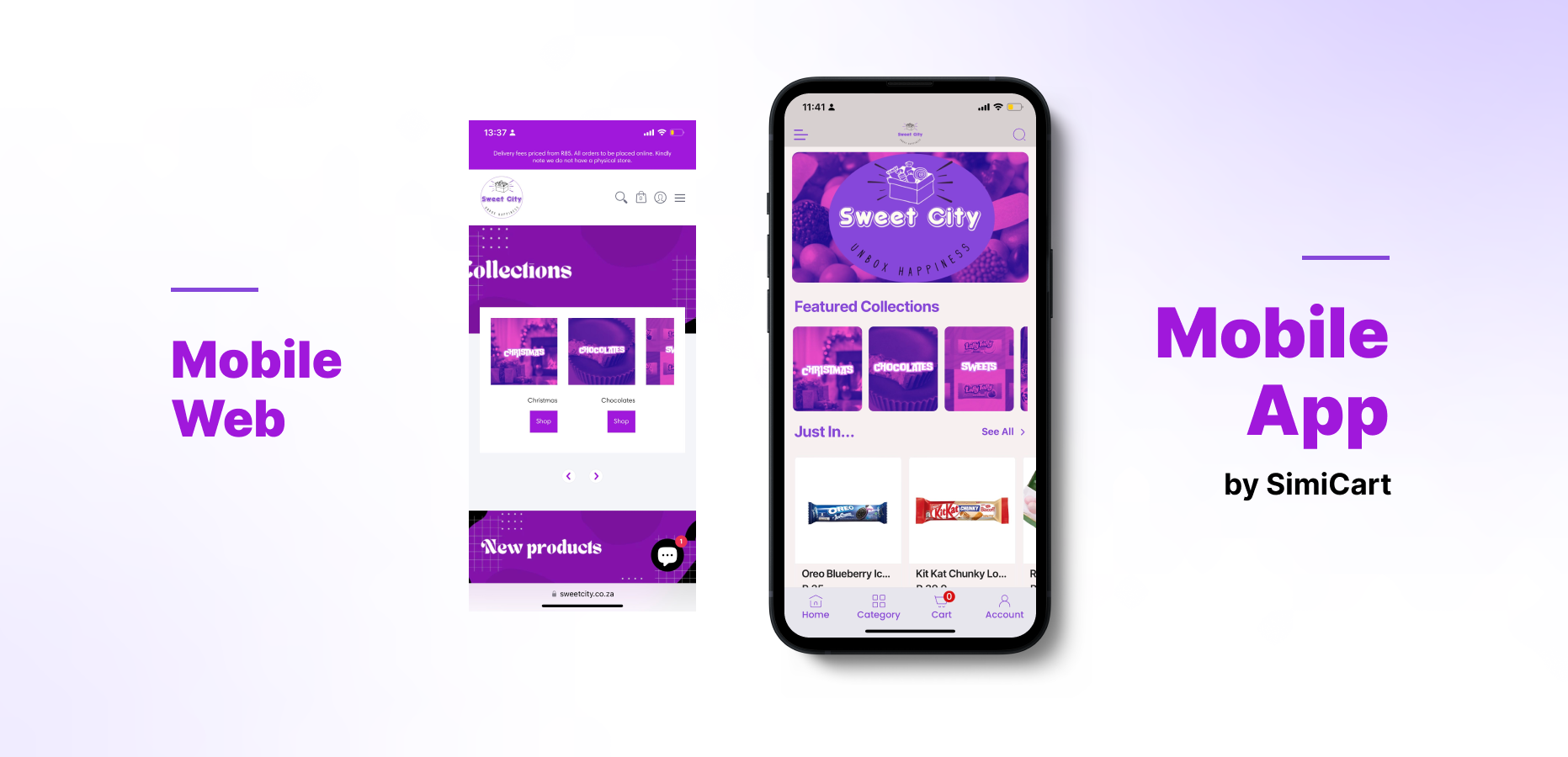What is an App Builder? Types, Benefits, Key Features And Specific Examples

In today’s tech world, app builders are more important for businesses and individuals. An app builder is a tool that helps to create, test and deploy web and mobile applications. This article will cover definition, benefits and use cases of app builders, with statistics and data from trusted sources. Let’s dive in!
See more:
- How to Create Mobile App No Coding: A Detailed Guide
- 8 Best Shopify Mobile App Builders For Your Store In 2025
- Top 8 Drag and Drop Mobile App Builder Reviews 2025
What is an app builder?
An app builder is a DIY tool that allows users, regardless of their technical background, to build mobile applications. These platforms are user-friendly, with drag-and-drop interfaces, WYSIWYG visual editors and pre-built components to make app development for everyone.

Simicart Shopify Mobile App Builder
Types of App Builders
There are various types of app builders available, each catering to different needs and skill levels. Here’s a breakdown of some popular app builders categorized by their features and intended users:
| Type | Feature | Examples | Best For |
| No-Code app builders | Create apps without coding; drag-and-drop interfaces | Simicart, Glide, Adalo, Thunkable | Beginners, rapid prototyping, simple app development |
| Low-code app Builders | Balance of ease and coding flexibility | Bubble, AppGyver, OutSystems | Users with some technical skills, startups, small businesses |
| Hybrid app builders | Build cross-platform apps using one codebase | Ionic, FlutterFlow | Developers who need cross-platform efficiency |
| Native app builders | Focus on platform-specific apps (iOS/Android) | NativeScript, Android Studio | Developers building highly optimized, platform-specific apps |
| Enterprise app Builders | Scalable, integrates with existing systems | Appian, Salesforce App Cloud | Large organizations, complex workflows, enterprise solutions |
| Specialized app Builders | Tailored for specific industries or use cases | GoodBarber, BuildFire, Shopify | Niche industries, content-driven apps, e-commerce |
Benefits of using an app Builder
Using an app builder has many benefits for individuals and businesses looking to make mobile apps. You can consider some of the top advantages:
- Easy to build app: App builders eliminate the need for programming skills. With drag-and-drop features, anyone can create and launch an app without any technical knowledge.
- Money saving solution: Compared to traditional app development, using an app builder is much more budget-friendly. It’s an ideal solution for solopreneurs or small businesses with limited resources.
- Quick launch: Building an app with an app builder is much faster than using traditional development methods. This allows you to bring your app to market quickly, which is crucial in today’s fast-paced world.
- Easy prototyping and testing: App builders allow you to experiment with different features and designs. You can make quick adjustments based on feedback, helping you improve the app before its final release.
- Customization made simple: Despite being code-free, app builders offer a variety of customizable options. You can adjust layouts, colors, fonts, and features to match your brand and meet user expectations.
Key features of app builders
When exploring what an app builder is and how it functions, understanding its key features is crucial. Here are the primary characteristics that make app builders a viable and efficient solution for creating mobile and web applications.
Drag-and-drop interfaces and visual editors
App builders make things easy with drag-and-drop interfaces and visual editors, so you can design your app without any coding skills. The WYSIWYG (What You See Is What You Get) setup lets you see changes as you go, making the process feel super intuitive.

WYSIWYG HTML Editor in Simicart App Builder
Pre-built themes, starter layouts and sample apps
To save time, most app builders offer pre-built templates and starter layouts. Whether you’re making a shopping app or a blog, these ready-made structures allow you to customize the app with your content quickly and easily.

Simicart offers pre-built templates and starter layouts
Connectivity and API integration features
Need your app to connect with social media, payment gateways or databases? App builders often offer built-in features for API integration, thus you can easily add advanced functionalities without the headache of coding.
Data analytics and business intelligence capabilities
Many modern app builders like Alteryx app builder offer integrated data analytics and business intelligence tools. These features help users track app performance, user behavior, and other key metrics, providing valuable insights that can be used to improve the app and enhance user experience.

Alteryx app builder
Integrated AI functionalities for rapid development
Some app builders go a step further by using AI to help speed up development. AI can handle repetitive tasks, suggest design tweaks and even help with content, making the whole process more efficient.

AI App Builder Interface
Cross-platform compatibility
With app builders, you can create apps that work across iOS, Android or web platforms, all from one development process. This ensures your app can reach a wider audience without extra work for each platform.
Support and maintenance
App builders typically provide comprehensive support from built-in tools for development, testing, debugging, deployment to ongoing maintenance to keep the app functional and up-to-date. Hence, you don’t need to worry about server issues or other technical problems as the app builder provider handles these aspects.
How app builders work?
To understand what an app builder is, it’s necessary to explore how these tools help create and deploy mobile and web applications. Here’s a breakdown of the steps involved:

App builder development Process
1. Design phase
The process starts with the design phase, where users use the app builder’s drag-and-drop interface to add components like text, images, buttons and other interactive elements. The WYSIWYG (What You See Is What You Get) approach ensures that you can see their app take shape in real-time, making it easier to make adjustments and iterations.
2. Use of prebuilt templates and layouts
App builders offer prebuilt templates and starter layouts that can be customized to meet specific needs, saving time and effort compared to designing an app from scratch. For example, if you are creating a restaurant app, you can select a template that already includes features like menus, ordering systems, and customer reviews.
3. Connectivity and API integration
During the design phase, you can integrate APIs to connect your app to external services like social media, payment gateways, or other third-party tools for enhancing functionality. Besides, app builders often simplify the development process by providing pre-configured API connections that can be easily integrated into the app.
4. Testing and Debugging
Once you complete the app design, the next step involves testing and debugging. App builders typically include built-in testing tools that let you test the app across different platforms and devices, helping identify and fix bugs before deployment. The automated testing features in many app builders such as Appium, Selenium, TestRigor,…can speed up this process, ensuring that the app is stable and functional.
5. Deployment
After testing, the app is ready for deployment. App builders handle the deployment process, ensuring that the app is published on various platforms such as the App Store, Google Play Store, or as a web application. The step includes submitting the app to the respective stores, which may involve adhering to specific guidelines and policies. The app builder takes care of the technical aspects, making the deployment process smoother and faster.

6. Ongoing maintenance and support
After the app is deployed, app builders often provide ongoing maintenance and support such as updates, bug fixes and performance optimizations. The support teams of app builders are usually available 24/7 to help with any issues you might encounter, ensuring that the app remains functional and up-to-date.

Simicart’s support team are always ready to support you from A to Z
See more: 10 Key Phases of Mobile App Development Process
Examples and Use Cases of App Builders
Studies show that app builders can slash development costs by 40–80% compared to traditional methods. Even better, businesses can launch apps in days instead of months. Here are some insightful examples to prove that:
Mobile applications for eCommerce businesses
Sweet City, famous for its mouthwatering desserts, wanted to make things easier and more enjoyable for customers. They realized the growing trend of mobile shopping and knew they needed an app to connect better with their customer. Taking challenges around managing orders and keeping customers engaged, they teamed up with SimiCart to build a custom app.
The new app made it simple for customers to browse the menu, place orders directly and even access special offers and loyalty rewards. After launching, Sweet City saw a big boost in customer engagement, smoother order processing, and plenty of positive feedback about the app’s convenience and ease of use.

Internal enterprise apps
Big companies like Shopify, eBay motors, Walmat…use app builders to make their teams more efficient. For example, Walmart leveraged React Native to build their mobile app, allowing them to share 95% of their codebase between Android and iOS platforms. It has not only reduced development time but also enabled a single team of JavaScript developers to manage both platforms, fostering better collaboration and efficiency across their teams.
Educational and Learning Apps
Educational institutions have also leveraged app builders to create interactive learning apps. Take MyTutor, for example.
They teamed up with Geniusee to create educational platforms for the U.S. and U.K. markets. In just two months, they launched multiple platforms offering features like customizable timetables, secure payments, dedicated interfaces… for students, teachers and tutors.
As a result, over 1300 secondary schools now use MyTutor to power online learning and tutoring, all thanks to the fast, flexible tools of app builders.
What is the limitation of using an app builder?
Using app builders is a fantastic idea to create apps quickly and easily, but they’re not without their challenges. Here’s a closer look at some of the limitations to keep in mind:
- Need for advanced features: App builders are awesome for simple apps, but if you need something complex like custom workflows or unique integrations, you’ll probably hit a wall without some coding.
- Dependence on the platform: Since your app relies on the builder’s platform, any glitches, downtime, or changes they make can directly affect your app.
- User experience and design limitations: The pre-made templates are convenient, but they can feel a bit restrictive if you’re trying to create a truly unique or tailored user experience.
- Scalability Issues: As your app grows, an app builder might not keep up with your needs. Large user bases or more complex requirements can push the platform to its limits, leading to performance hiccups or the need to migrate to custom development.
- Security concerns: Most platforms offer decent security, but if your app handles sensitive data, you’ll want to make sure their protections are enough—or plan for extra safeguards.
- Learning curve for advanced features: Getting started is super easy, but diving into the advanced features can take some time, especially if you’re new to app building.
FAQs
What does an app builder do?
An app builder is a tool that helps you create apps without needing to code. It’s like a drag-and-drop system for designing your own app.
What does it mean to build an app?
Building an app means creating software that runs on phones or the web, doing specific tasks like helping users shop, learn, or connect with others.
Is it cheaper to build an app or website?
Websites are usually more affordable to build and maintain, while apps can be pricier because they need to work on different devices.
Is it hard to build an app?
It can be tricky if you’re coding from scratch, but tools like app builders make it much easier, even for beginners.
The price can vary a lot, from a few thousand dollars for simple apps to over $100,000 for more complex ones.
Do you need to be a programmer to build an app?
Not at all! With app builders, you can create an app without writing a single line of code.
Are app builders worth it?
Absolutely! They’re great if you’re on a budget or just need something simple and fast.
Can I build my own app for free?
Yes, some app builders such as Simicart, Adalo, Bubble, Appgyver,…let you start for free, though you might have to pay for extra features later.
In conclusion, understanding what an app builder is and how it functions can significantly transform the approach to mobile app development for individuals and businesses alike. An app builder is an online software tool that enables users to create and publish mobile apps efficiently, regardless of their programming skills.
If you are considering creating a mobile app but lack the technical expertise or resources, an app builder like Simicart Mobile App Builder could be the perfect solution. With its intuitive interface, pre-built templates, and extensive customer support, Simicart allows you to build a high-quality mobile app quickly and efficiently. For more information, you can visit Simicart Mobile App Builder on Shopify!

